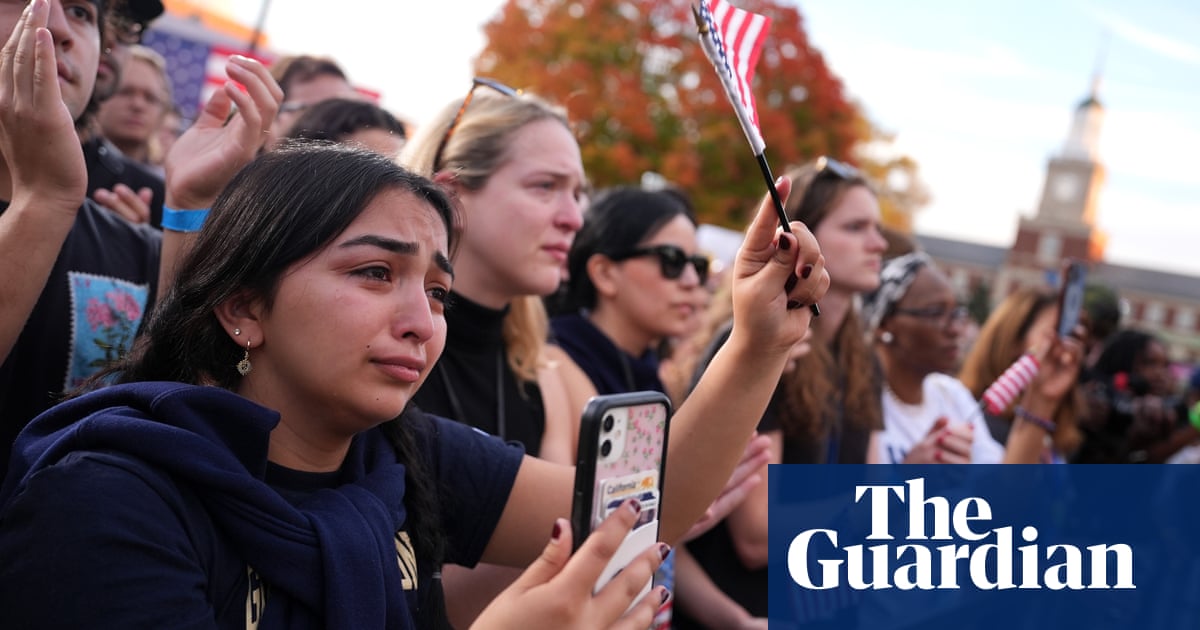The mood was calm and sober on the Howard University campus as people waited to hear vice-president Kamala Harrisâs concession speech on Wednesday afternoon. An area that is usually the central hub of campus life, the Yard, was mostly filled with Harris campaign staff, media and members of the public.
Harris appeared about 25 minutes after her scheduled time and opened with a message on unity, building community and coalitions. âMy heart is full today,â Harris said. âFull of heart for my country, and full of resolve.
âHear me when I say that the light of Americaâs promise will always burn bright. As long as we never give up and as long as we keep fighting.â
Harris encouraged young people to acknowledge their power and to believe in the impossible. âAt this time, itâs necessary that people not become complacent,â she added, âbut to commit to organizing and mobilizing.â Harris encouraged her supporters to embrace âthe light of optimismâ and of service.
âHear me when I say that the light of Americaâs promise will always burn bright. As long as we never give up and as long as we keep fighting.â
Harrisâs supporters expressed shock, grief and disillusionment as they reflected upon the harrowing hours since the election was called for Republican candidate, Donald Trump. Instead of feeling galvanized to build resistance movements, voters said that they needed time to rest and reset before thinking of next steps after the election.
âIt revealed to me the heart of us as a nation,â 47-year-old Janeen Davis, a county government employee said. âItâs taking my pride away. Being an Indigenous person, it hits me hard. Our democracy is built upon our Indigenous ancestors ⦠and so much has been torn from the Indigenous community, and so now that thatâs at stake, itâs like thereâs nothing left.â Davis said that she was in fear of political violence from Trump supporters if his opponents resist his presidency now. âMy personal opinion is because of how the transition happened last election,â Davis said. âThe best thing that we can do is be still right now.â
Patricia McDougall, a 63-year-old staff member at Howard University, said that she felt sad. She believed that, had she won, Harris would have supported immigrants and helped fight for womenâs reproductive rights. âAs an immigrant myself [from Belize], I feel bad about the people who are going to be left behind,â McDougall said. âI thought that she was going to move the needle and help people.â
As an ambassador for the United Nations, McDougall expressed anxiety about Trumpâs foreign policy moves in the future, adding that his âmouth destroys him.
âWe are all on edge to see what heâs going to do and how heâs going to do.â
Davis was similarly concerned that Trumpâs presidency may spell disaster for foreign relations. Since exit polls revealed how divided the electorate is, Davis warned: âA divided nation canât stand, so itâs going to make us more susceptible to outside threats.â
Despite her defeat, voters said that they were proud of Harris and her campaign team for what they accomplished in the months since inheriting Joe Bidenâs campaign after he dropped out of the race during the summer. Nadia Brown, a political science professor at Georgetown University and a fellow Howard University alumna, had watched the election results pour in from the campus on election night. Returning to the scene after Harrisâs crushing defeat was sobering, but she was in a place of acceptance and didnât feel sadness.
For Brown, she said that the election results posed âlarger questions to ask around what the Democratic party needs to do to maintain the core voting blocâ. She observed that the concerns of young people and progressives who opposed Israelâs war on Gaza where more than 41,000 Palestinians have been killed since last October were not taken seriously. Brown also called into question the Democratic partyâs strategy, saying: âThe base was not shored up before moving to swing voters, which were the Republicans who were never Trumpers.â
Looking toward the future, Brown said that the Democratic party must reconsider its outreach strategy. âBlack women in particular did a great job. I have no regrets or hard feelings about the way that Black women showed up,â she said. âBut now itâs how [does the party] reach some of the other folks.â
Read more of the Guardianâs 2024 US election coverage



